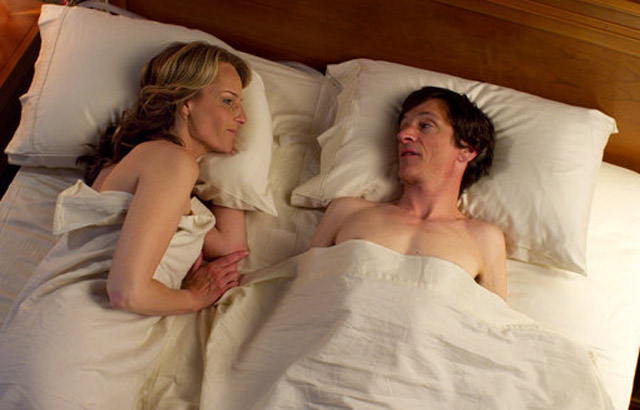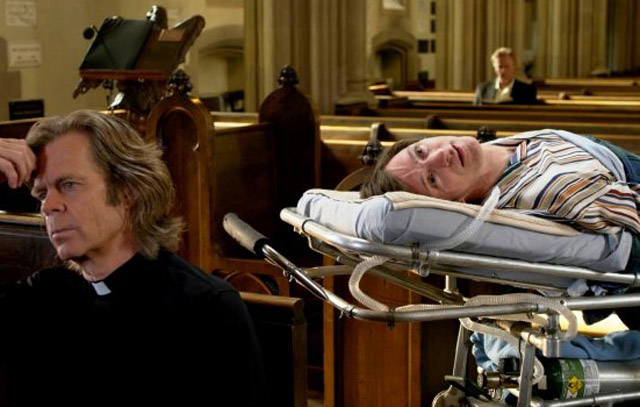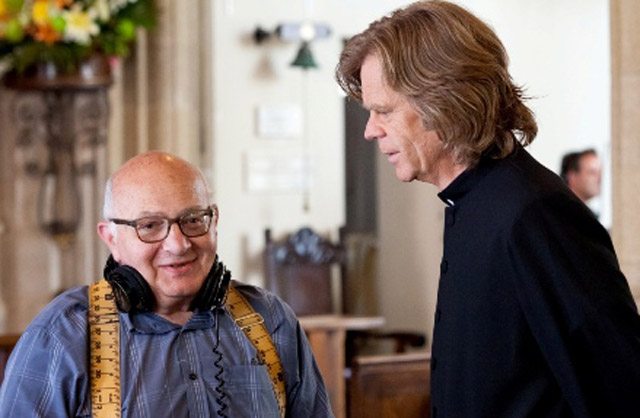CHICAGO – In anticipation of the scariest week of the year, HollywoodChicago.com launches its 2024 Movie Gifts series, which will suggest DVDs and collections for holiday giving.
Interview: John Hawkes, Director Ben Lewin on ‘The Sessions’
CHICAGO – Sure to be one of the best performances of 2012 is John Hawkes as Mark O’Brien, a polio victim who lived on his own and was a poet, despite no movement from his neck down, and confined for most of the day in an iron lung. Ben Lewin wrote the screenplay and directed the extraordinary story of “The Sessions.”
John Hawkes had been a journeyman actor since the late 1980s, when he began to break out starting with a role in HBO’s “Deadwood,” as Sol Star. During that period, he was noticed in the film “You and Me and Everyone We Know” (2005), but came out in a major way with “Winter’s Bone” (2010), for which he was nominated for an Oscar. “Martha Marcy May Marlene” followed a year afterward, and a notable role in “Eastbound and Down” on HBO. “The Sessions” is a film that he has to carry, given that he portrays the main character, Mark O’Brien.
Ben Lewin is another veteran writer and director, working mostly in television since the 1970s. His last notable feature film was “The Favour, the Watch and the Very Big Fish” (1991), which he wrote and directed. This is his first directorial effort since the TV series “Touched by an Angel” in 2003.
“The Sessions” is the true story of Mark O’Brien, who hired a sex surrogate (Helen Hunt in the film) to teach him the variations on human sexual contact. HollywoodChicago.com interviewed Hawkes and Lewin with a panel of other film reporters, and the questions were as varied and unique as the film itself.
 John Hawkes, Portrays Mark O’Brien in “The Sessions”
John Hawkes, Portrays Mark O’Brien in “The Sessions”
 Photo credit: Fox Searchlight Pictures |
HollywoodChicago.com: What type of physicality did you want to emphasize to personify Mark O’Brien’s handicap?
John Hawkes: Besides the short film about him called ‘Breathing Lessons,’ which was the best tool an actor could have, there are a couple points in the script that tells that Mark’s spine is horribly curved, and I need I had to approximate that. There is a line when Mark says he hasn’t seen his penis in 30 years, Helen’s (Hunt) character remarks that the curvature of his spine may make some positions impossible. That was it in my mind, and since we weren’t going to a body double or prosthetics or CGI of any kind, I knew I needed to approximate the scoliosis that he lived with, and I formulated in my mind a device – firm foam about the size of a soccer ball, wrapped in duct tape – and placed it under the left side of my back. That gave my body that incredibly odd look that I wanted and needed for the film. It was the best way to physically illustrate the disability. Many other things went into it, but that was the key.
HollywoodChicago.com: There was a quote that you made regarding a role you were going after, in which you said you felt ‘shameful every day.’ What is the feeling behind that quote?
Hawkes: It was an exaggeration of sorts, I guess I should be shameful sitting in this nice hotel suite, with free food and coffee. [laughs] This isn’t my upbringing. I think it was a glib response, the director did imply that alienation and I said ‘every day.’ There are some days when I sleep all day. [laughs]
HollywoodChicago.com: In relating that to Mark O’Brien, did you regard him as an outsider?
Hawkes: I think it’s just a given. When you live in an iron lung, you’re not going to be a mainstreamer. You’re going to be inside a lot, an insider as much as an outsider. I didn’t have to push that as much, but as Mark said in his autobiography, that he felt that disabled people were invisible to able bodied people. He was referencing the book ‘Invisible Man’ by Ralph Ellison, about an African American man in the 1950s. The situation at the top is fraught with being an outsider, I didn’t have play against the fact that Mark was dealt a bad hand.
HollywoodChicago.com: Did he transcend that outsider status, in your opinion?
Hawkes: I think towards the end of his life he fell in love, he had his poetry published and was beginning to be noticed. He was being interviewed and had the documentary short film about his life win an Academy Award. These were all things that made him feel less alone in the world for sure.
HollywoodChicago.com: How did train yourself to use the mouth stick that O’Brien uses to type and answer the phone?
Hawkes: I went to the hardware store and bought a piece of dowel rod, cut it to proper length, got a pencil eraser and slipped it over one end, and on the other end had duct tape and a kid’s balloon over it so I could get the right grip. I would then lie on the couch and type, turn the pages of a book and dial the phone.
If I was doing a play with this character, I probably would have put a hundred hours into the process, but with film I could drop the mouth stick occasionally, and it wouldn’t matter. When I saw the finished film, I was a bit disappointed that there wasn’t much mouth stick action, because I got pretty good at it, but the film isn’t about the mouth stick.
HollywoodChicago.com: Despite what most people say, disabled people do tend to have a different emotional make-up, how did you find your way into that?
Hawkes: Most of it was in the script, and the rest of it was an attempt to fight self pity. Just at the outset, that was a mandate before I accepted the role, and when I talked to Ben [Lewin, the director] at our first meetings, he readily agreed. We were in real agreement about how we were going to tell this story on some level. Also lying on that foam ball, my body twisted into an awkward position and trying to keep no movement from the neck down, often that would make me angry and frustrated enough so that if I needed to feel that way in the scene, it was easy to access.
HollywoodChicago.com: You said at the Q&A after the movie last night, that you were trying directly to imitate the voice of Mark O’Brien. When play a real person, how is that different than just capturing the emotions?
 Photo credit: Fox Searchlight Pictures |
Hawkes: If you’re playing Richard Nixon for example, someone who is known and there is footage of, you’re going to try to emulate the character and use the voice. Since there was the film documentary of Mark O’Brien, at first I was afraid to watch it during my first weeks of preparation, but when I did I still had seven weeks to prepare. It changed everything. I like specificity as an actor, and it was very specific as to his attitude, how his body was twisted, the sound and timbre of his voice.
So I tried to impersonate Mark as best as I could, because I feel like the more specific you can be in truthful details in any story that you tell, the more universal the story will become and I knew that people who knew Mark would see the film, and I wanted them to recognize at least something of their friend or family member in their performance.
HollywoodChicago.com: It was interesting when Mark in the film talked to his attendant about the first time she had sex. What did you bring in from the experience of your first time to the character you portrayed?
Hawkes: I’m not a trained actor, but I’ve read that part of the method might be to use sense memory. But when something is so well written and vital for us, as actors to pretend, that is enough to bring the emotion that is needed for the scene.
One thing that really helped is that Helen Hunt and I avoided each other before the shoot. We were told that the four sessions would be shot chronologically, which was a great gift from Ben. And so in the first session scene we didn’t know each other. In the film we were able to capture something for the very first time between two human beings, and capture it for all time. So a lot of what is going on in the first session scene, between me and Helen, is happening for the first time. That was the key. Then as we got to know each more as the sessions were filmed, then we were more comfortable.
HollywoodChicago.com: You’ve talked about your almost over preparation for a film. Given that this was a technical shoot, were you more like an analyzer on set or a poet artist?
Hawkes: I try to be both. The analyzer part is the preparation and poet part is to forget everything I’ve preconceived when the director calls action and letting it all happen. And by the way, from the technical side, I was never not on my mark. [laughs] I had my blocking down cold.
HollywoodChicago.com: This this experience teach you more about acting, or just life in general?
Hawkes: It taught me you can move your head 90 degrees and that is the sum of your movement, and have it work okay. As a whole, like everyone in human nature, I’ve haven’t had great ease when encountering disabled people. I’ve always tried to be very inclusive and open to people, wanting to believe that every person I come across has value and worth, until they prove otherwise, and it is the same for disabled people. Hopefully now I see the person more.
 Ben Lewin, Director of “The Sessions”
Ben Lewin, Director of “The Sessions”
 Photo credit: Fox Searchlight Pictures |
HollywoodChicago.com: How have audiences been reacting in general in your pre-screenings of the film?
Ben Lewin: I find them really fascinating. In most cases, there is someone in the audience that you pushed a very button on, and they come out with very private information. They feel comfortable venting something that in other venues would be very personal information. In Toronto, for example, there was a guy who got up and said he’d been a sex surrogate for 30 years, and it was somehow the first time he felt comfortable talking about it publicly. That wasn’t the first time that someone in the sex surrogate community – whatever that is – has stepped up and said that they identified with the film.
HollywoodChicago.com: The film presented that balance between our emotional state and our physical nature. What do you think the advantage is, as human beings, that we have emotions that interact with our physical beings?
Lewin: I guess the underlying notion in the movie is that sex is only the beginning, that physical connection is a root to emotional connection. I think in the case of Mark O’Brien, there is a hold element of him being starved of touch. I think this was an indication that he was only used to being touched medically or mechanically, and I think that people take for granted that touch, even among relative strangers, is an everyday thing. It is an emotional communication, either trivial or more meaningful. That is what Mark was deprived of, and I think we made quite a big deal about his body awareness exercises as a root to understanding that touch can be pleasurable.


